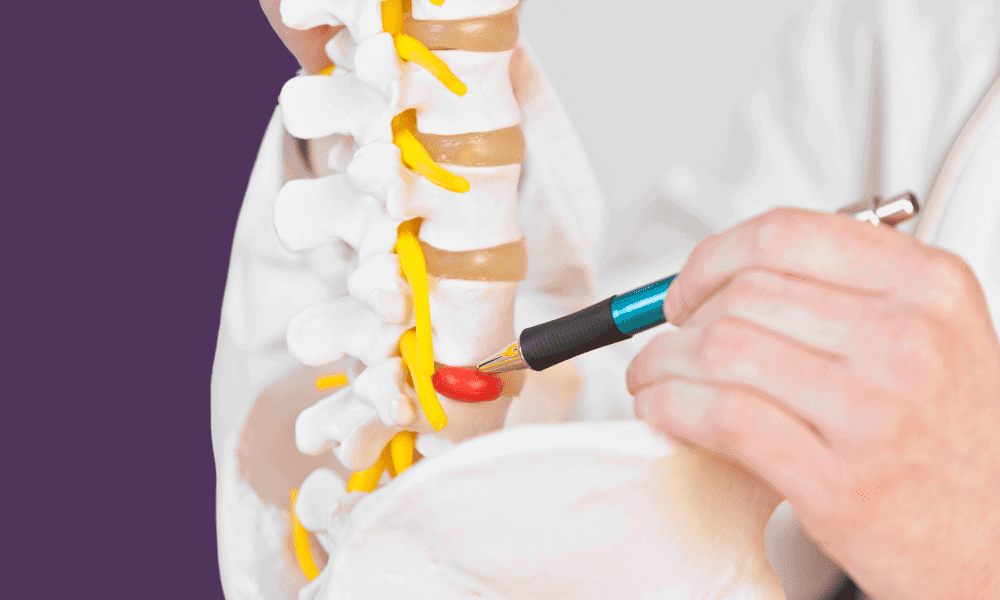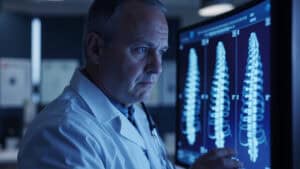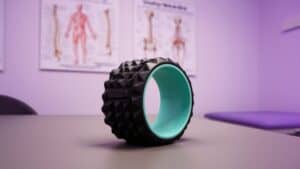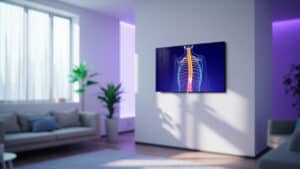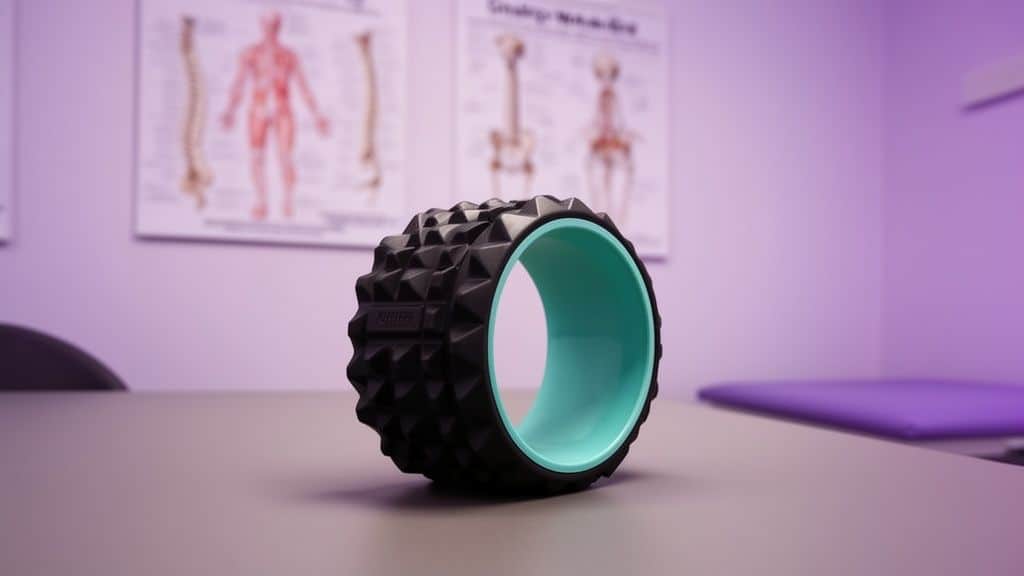Key Takeaways from “Herniated Disc Symptoms, Causes, and Treatment”
- Understanding Herniated Discs: A herniated disc occurs when the soft center of a spinal disc pushes through a tear in the tougher exterior, potentially causing pain, numbness, and other symptoms.
- Symptoms Can Vary: Depending on the location of the herniated disc, symptoms can range from localized pain to widespread numbness or weakness.
- Seek Medical Attention Early: It’s important to consult a physician like Dr. Wiederholz for persistent or worsening symptoms to avoid complications.
- Causes and Risk Factors: Age-related degeneration, lifestyle choices, and genetic predisposition can all contribute to the risk of herniated discs.
- Diagnosis Involves Imaging: MRI and CT scans are key tools used to diagnose the precise location and severity of a herniated disc.
- Non-Surgical Treatments Are First-Line: Physical therapy and medications are often effective initial treatments for managing herniated disc symptoms.
- Surgical Options for Severe Cases: Minimally invasive procedures like The Discseel® Procedure may be considered if non-surgical treatments fail.
- Lifestyle Adjustments for Long-Term Management: Regular exercise, proper posture, and a healthy diet are crucial for managing and preventing herniated discs.
- Prevention Is Key: Engaging in regular physical activity, maintaining good posture, and having routine health check-ups can help prevent herniated disc issues.
- Expert Care Available: Dr. Matthias Wiederholz and his team at Performance Pain and Sports Medicine offer comprehensive care for herniated disc treatment.
Herniated Disc Overview
Herniated spinal discs, often referred to as bulging, slipped, or ruptured discs, are a common yet misunderstood spinal condition.
In this comprehensive guide, we delve into the intricacies of spinal disc herniation, offering insights from Dr. Matthias Wiederholz, MD, a board-certified pain management expert at Performance Pain and Sports Medicine.
With his extensive experience in treating spinal disc injuries, including innovative procedures like The Discseel® Procedure, Epidural Steroid Injections, Endoscopic Discectomy Procedure, and Intrathecal Pain Pumps, Dr. Wiederholz is a trusted authority in this field.
He is available for consultations in Houston and Lawrenceville, and offers medical advice on the BICMD platform, ensuring patients receive the highest standard of care for their spinal health needs.

Understanding Herniated Discs
What is a Herniated Disc?
A herniated spinal disc occurs when the soft, jelly-like center of a spinal disc pushes through a crack in the tougher exterior casing.
This condition can lead to discomfort and nerve irritation. While some people experience no symptoms, others may suffer from significant pain or numbness, often indicative of the herniated disc pushing on the spinal cord.
Anatomy of the Spine and Discs
The human spine is a complex structure composed of vertebrae and discs. The discs act as shock absorbers, providing flexibility and support to the spine.
When these discs are compromised, as in the case of a spinal disc bulge or protrusion, they can impinge on nearby nerves, leading to the symptoms associated with spinal disc herniation.
Symptoms of Herniated Discs
Regional Symptoms of Herniated Discs
Cervical Region:
- Neck pain
- Arm pain and tingling
- Weakness in the hands
Thoracic Region:
- Upper back pain
- Radiating chest pain
Lumbar Region:
- Lower back pain
- Sciatica
- Leg numbness and weakness
Common Symptoms
Symptoms of a herniated disc can vary depending on the disc’s location and severity. Common signs include pain, numbness, and a tingling sensation in the affected area.
In more severe cases, such as a herniated disc pushing on the spinal cord, symptoms may include muscle weakness or loss of function in the limbs.
Variations Based on Disc Location
The location of the herniated disc plays a crucial role in symptom manifestation. A lumbar disc herniation may cause lower back pain and sciatica, while a cervical disc herniation might result in neck pain and radiating discomfort in the arms.
When to Seek Medical Attention
It’s essential to consult a healthcare professional like Dr. Wiederholz if you experience persistent or worsening symptoms of a spinal disc injury. Early diagnosis and treatment can prevent further complications and aid in a quicker recovery.
Causes and Risk Factors
Factors Contributing to Herniated Discs
- Age-Related Degeneration: Natural wear and tear over time.
- Lifestyle Factors: Obesity, poor posture, repetitive strain.
- Genetic Predisposition: Family history of spinal disc issues.
Age-Related Degeneration
As we age, our spinal discs naturally degenerate, losing their flexibility and resilience. This degeneration can lead to conditions like spinal disc bulge or herniation.
Lifestyle and Environmental Factors
Factors such as obesity, poor posture, and repetitive strain can increase the risk of developing a spinal disc protrusion or herniation. Maintaining a healthy lifestyle and being mindful of spinal health can mitigate these risks.
Genetic Predisposition
Research suggests that genetics may play a role in one’s susceptibility to spinal disc injuries, including herniated discs.

Diagnosing Herniated Discs
Physical Examinations and Medical History
A thorough physical examination and review of medical history are vital in diagnosing a herniated disc. Dr. Wiederholz employs a comprehensive approach to ensure an accurate diagnosis, considering all potential factors contributing to the patient’s condition.
Imaging and Diagnostic Tests
Advanced imaging techniques like MRI and CT scans are instrumental in diagnosing spinal disc herniation. These tools allow for a detailed view of the spinal structure, aiding in pinpointing the exact location and severity of the herniation.
Treatment Options
Treatment Options for Herniated Discs
Non-Surgical Treatments
- Physical Therapy: Tailored exercises and stretches to strengthen the back muscles and improve flexibility.
- Medications: Over-the-counter pain relievers and anti-inflammatory drugs, and possibly muscle relaxants.
Minimally Invasive Procedures
| Procedure | Description |
|---|---|
| The Discseel® Procedure | An innovative treatment using biologic tissue to seal and repair spinal disc tears. |
| Epidural Steroid Injections | Delivers steroids directly into the epidural space to reduce inflammation. |
| Endoscopic Discectomy Procedure | A less invasive option using an endoscope to remove or repair damaged disc material. |
| Intrathecal Pain Pumps | Implants a pump to deliver pain medication directly into the spinal fluid. |
Surgical Treatments
| Procedure | Description |
|---|---|
| Spinal Fusion Surgery | Stabilizes vertebrae in cases of significant instability. |
| Artificial Disc Replacement | Replaces the damaged disc with an artificial one to preserve spine movement. |
Treatment Options for Herniated Discs
Non-Surgical Treatments
Non-surgical treatments are often the initial approach for managing herniated disc symptoms. These treatments focus on relieving pain and improving mobility without the need for surgery. Dr. Matthias Wiederholz, with his expertise in pain management, recommends the following non-surgical options:
- Physical Therapy: Tailored exercises and stretches to strengthen the back muscles and improve flexibility, thereby alleviating pressure on the herniated disc.
- Medications: Over-the-counter pain relievers and anti-inflammatory drugs can help reduce pain and swelling. In some cases, muscle relaxants may also be prescribed to ease muscle spasms.
Dr. Wiederholz stresses the importance of a personalized treatment plan, considering each patient’s unique symptoms and overall health.
Minimally Invasive Procedures
When non-surgical treatments do not provide sufficient relief, minimally invasive procedures can be an effective alternative. These procedures, offered at Performance Pain and Sports Medicine, are designed to alleviate pain with minimal recovery time:
- The Discseel® Procedure: An innovative treatment that uses a biologic tissue to seal and repair spinal disc tears, potentially restoring spinal disc function.
- Epidural Steroid Injections: These injections deliver steroids directly into the epidural space in the spine, reducing inflammation and relieving pain caused by nerve irritation.
- Endoscopic Discectomy Procedure: A less invasive surgical option that involves the use of an endoscope to remove or repair the damaged disc material causing nerve compression.
- Intrathecal Pain Pumps: This procedure involves implanting a pump that delivers pain medication directly into the spinal fluid, providing continuous pain relief for severe chronic pain that hasn’t responded to other treatments.
These procedures are characterized by their minimal disruption to the body, leading to quicker recovery times and less postoperative discomfort.

Surgical Treatments
In more severe cases of herniated discs, where both non-surgical treatments and minimally invasive procedures are unable to provide relief, surgical intervention may be necessary. Surgical treatments are considered as a last resort due to their invasive nature and longer recovery periods:
- Spinal Fusion Surgery: In cases where the herniated disc causes significant instability in the spine, spinal fusion surgery may be recommended to stabilize the affected vertebrae.
- Artificial Disc Replacement: This surgical option involves replacing the damaged disc with an artificial one, which can help preserve more natural movement of the spine compared to spinal fusion.
Each surgical option is carefully considered based on the patient’s specific condition, overall health, and lifestyle. Dr. Wiederholz ensures that patients are fully informed about the benefits and risks associated with each surgical procedure, helping them make an informed decision about their treatment plan.
Living with a Herniated Disc
Managing Pain and Discomfort
Effective management of herniated disc symptoms is crucial for maintaining quality of life. Dr. Wiederholz advocates for a holistic approach, combining medical treatments with lifestyle modifications to manage pain and discomfort effectively.
Long-Term Care and Lifestyle Adjustments
Long-term management of a herniated disc involves regular medical check-ups and lifestyle adjustments. Incorporating regular exercise, maintaining proper posture, and adhering to a healthy diet are key components of effective long-term care.
Prevention Strategies
Preventive Measures for Spinal Health
- Exercise Regularly: Strengthens back muscles and supports the spine.
- Maintain Good Posture: Reduces unnecessary strain on the spine.
- Healthy Weight: Decreases pressure on the spinal discs.
- Ergonomic Work Environment: Aligns spine correctly during work activities.
- Regular Medical Check-Ups: Early detection and management of spinal issues.
Exercise and Physical Activity
Regular exercise strengthens the muscles supporting the spine, reducing the risk of spinal disc injuries. Dr. Wiederholz recommends a balanced exercise regimen to maintain spinal health.
Posture and Ergonomics
Proper posture and ergonomic practices are essential in preventing spinal disc herniation. Simple adjustments in daily activities can significantly reduce the strain on the spine.
Regular Health Check-Ups
Routine health check-ups play a vital role in early detection and prevention of spinal issues. Dr. Wiederholz encourages regular consultations to monitor spinal health and address any concerns promptly.
Conclusion
Understanding herniated disc symptoms, causes, and treatment options is crucial for effective management and prevention of this condition.
Dr. Matthias Wiederholz, MD, at Performance Pain and Sports Medicine, offers expert care and innovative treatments for those suffering from spinal disc herniation.
With his guidance and the support of his team, patients can achieve optimal spinal health and an improved quality of life.

FAQ Section
Q: What are the common symptoms of a herniated disc? A: Common symptoms include pain, numbness, tingling, and in severe cases, muscle weakness or loss of function.
Q: Can lifestyle changes help prevent herniated discs? A: Yes, maintaining a healthy weight, practicing good posture, and regular exercise can help prevent herniated discs.
Q: Are there minimally invasive treatments for herniated discs? A: Yes, treatments like The Discseel® Procedure, Epidural Steroid Injections, and Endoscopic Discectomy Procedure are minimally invasive options for herniated disc treatment.
Q: How often should I consult a doctor for spinal health? A: Regular check-ups are recommended, especially if you have risk factors or symptoms of spinal disc issues.
Q: Can herniated discs heal without surgery? A: Yes, many cases can be effectively managed with non-surgical treatments like physical therapy and medications.

